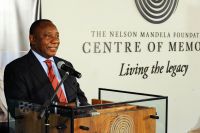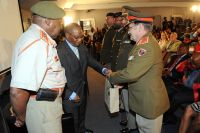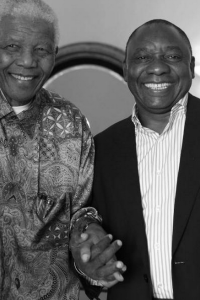
Deputy President Cyril Ramaphosa delivers the Memorial Address at the Nelson Mandela Foundation. Photo courtesy of Lettie Ferreira/NMF
Former President Nelson Mandela’s legacy is one of moral leadership, a quality that all South Africans – both leaders and citizens – should emulate.
That was the main message from South African Deputy President Cyril Ramaphosa, who delivered a Memorial Address in honour of the global icon at the Nelson Mandela Foundation in Johannesburg on Monday 15 December 2014.
Ramaphosa’s address marked the end of 10 days of activities to honour Madiba, who passed away on 5 December last year. The Foundation collaborated with the ANC for the event.
The Deputy President told a large group of attendees from the diplomatic corp, government, civil society and the South African National Defence Force (SANDF) that the world-renowned statesman was inspirational because he was not only a leader with conviction, but a leader with a conscience.
“ He understood that revolution is grounded in morality. ”
“For Nelson Mandela, morality was not theoretical; it was practical. It was the means by which people could improve their condition. It was the means by which we could change the world. Morality provided a touchstone from which one could measure one's actions and guide one's decisions,” he said.
Ramaphosa said Mandela, and the leaders of his generation, had strong values, which guided their politics.
“He understood that revolution is grounded in morality. Politics must be bound by principle. He understood that a society such as ours, which is characterised by such enormous disparities of wealth and opportunity, is not only unsustainable; it is also morally indefensible.”
Ramaphosa also remarked that the responsibility of fixing this society lies with citizens and leaders in both the public and private sectors. Such an effort could only succeed if individuals, like Madiba, made decisions that were morally sound.
“We cannot accept the wasteful use of public resources. We cannot accept the misuse of public resources. And we cannot accept the theft of public resources,” he warned.
He also threw down the gauntlet to businesses.
“If there is any value in the millions of rands that corporate South Africa spent in paying homage to Madiba, then business needs to embrace the implications of his message. It has a responsibility to be an active participant in the fundamental transformation of the economy,” he said.
Introspection on leadership in South Africa proved to be the thread that ran through the evening.
The Chairperson of the Foundation, Professor Njabulo Ndebele, said recent disruptions in Parliament suggest an urgent need for a national dialogue that will help revitalise South Africa’s vision. He urged the ANC to consider a such an engagement between itself and opposition parties, which could be facilitated by the Foundation. He also urged the ruling party not to ignore the disruptions.
“However discomforting and disconcerting the experience may have been, some may see in it a signal for a need for something new to emerge. It seemed the contestants were crying out, without saying so, for something to believe in together,” he said.
Paying tribute
The Foundation also paid tribute to the SANDF for its immense work during last year’s 10-day mourning period. The two soldiers who drove the gun carriage that carried Madiba’s body to his final resting place in Qunu were honoured at the Memorial Address.
The carriage itself was parked outside the Foundation, and a plaque on it declares that it was taken out of service after performing that task. There are hopes that it will be kept permanently at the Foundation.

SANDF Lieutenant-General Bongani Mbatha and Foundation Chairperson Prof. Njabulo Ndebele thank SANDF members for their work during the 10 days of mourning last year. Photo courtesy of Lettie Ferreira/NMF
SANDF Lieutenant-General Bongani Mbatha vividly recalled the moment he received the sad news of Madiba's passing while stationed in Equatorial Guinea.
“I remember telling the hotel staff that we had to fly back because this had happened, and they asked ,‘Is there going to be a South Africa after this?’” he said.
Ndebele pointed out that this kind of question, which has been asked time and again since Mandela’s passing, actually underlines probably the most profound lesson of Mandela’s life: that individuals can make a huge difference.
He said this was never more clear than when Mandela himself frequently asserted that he was part of a "collective".
“Individuality is affirmed at the precise moment that it is denied. The capability to do so has particularly marked out people such as Madiba. It marked out Martin Luther King; marked out Mahatma Gandhi; marks out today the Dalai Lama, and countless other leaders who have pushed the frontiers of the human sensibility towards greater refinement,” Ndebele said.
“Indeed, the individual is the basic, most fundamental site of conscience, for the benefit of the greater human society.”
The Foundation also announced that it intends releasing a sequel to Long Walk to Freedom next year in commemoration of its 20-year anniversary on 14 December 2014. The book – called The Presidential Years – is based on manuscripts that Mandela worked on from 1998 to 2002.
